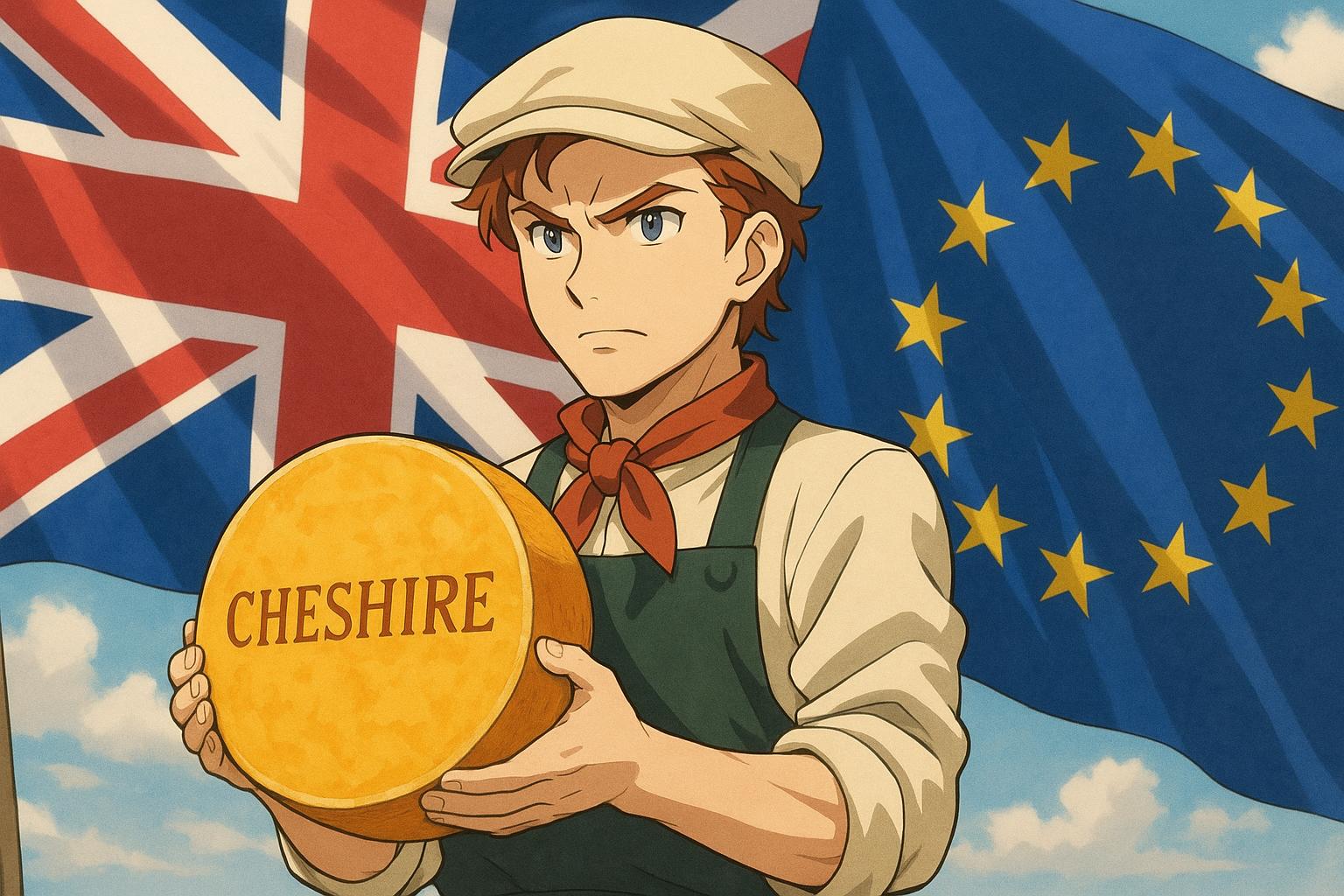Simon Spurrell, former co-founder of the Cheshire Cheese Company, welcomes the new UK-EU trade agreement aimed at easing export costs but laments its delayed arrival after he suffered substantial losses and sold his business due to Brexit barriers.
A British cheesemaker has cautiously welcomed a new agreement between the UK and the European Union aimed at reducing barriers to trade, yet he laments that such a development has come four years too late. Simon Spurrell, co-founder of the Cheshire Cheese Company, experienced the severe ramifications of Brexit firsthand, culminating in losses exceeding £600,000 and ultimately leading to the sale of his business last year.
After the UK’s departure from the single market, indirect selling costs surged due to stringent export regulations. Spurrell faced staggering charges of £180 for veterinary health certificates on retail orders bound for the continent, significantly undermining his profit margins. He remarked that this came just as his business was positioned for expansion, having committed £1 million to scaling operations.
The newly proposed arrangement, which draws inspiration from the previously rejected Swiss-style deal, is said to eliminate many of the sanitary and phytosanitary checks that had hindered trade. This resolution raises hopes among small and medium-sized enterprises that the cross-Channel market might once again be accessible. Spurrell expressed relief at seeing “the grownups back in the room,” a sentiment indicating a longing for more pragmatic and informed governance that prioritises business welfare over political posturing.
Despite the optimism surrounding the deal, Spurrell’s gratitude is tinged with frustration at the government’s previous decisions. He explained that the earlier rejection of a more favourable agreement resulted not only in his business’s struggles but also in the disintegration of countless small producers who lacked the resources to absorb the sudden spikes in export costs. “The biggest companies and supermarket chains were able to shoulder the costs. Now we can stop fishing in this small pond and cast our net wider again,” he reflected, signalling a rekindled hope for a broader market reach.
Spurrell’s remarks echo a broader narrative shared by many small business owners who felt disproportionately impacted during and after the transition period. In 2021, he reported losses of £250,000 and anticipated similar declines in 2022 before ultimately deciding to sell to a larger player in the sector, Joseph Heler Cheese. The acquisition was strategically driven by the need to leverage Heler’s established distribution network in the EU, a calculated move to navigate the bureaucratic minefield left in the wake of Brexit.
The new deal aims to alleviate some of these burdens. However, Spurrell remains vigilant; any effective implementation hinges on the finalised terms. He noted that the prospective relief could reshape operational frameworks for smaller businesses that were similarly forced to adapt, relocate, or cease trading altogether due to Brexit’s consequences.
The announcement of this agreement, while offering a glimpse of salvation for troubled exporters, highlights the ongoing challenges and complexities of navigating post-Brexit trade. Spurrell underscores the significant ripple effects the government’s decisions have had on the livelihoods of individuals and the fortunes of countless businesses dependent on export viability. With jobs on the line, including the retention of his workforce and plans for further hiring, the stakes are critical.
As the details of this new framework unfold over the coming year, many will be watching closely to see if it indeed succeeds in mending the fractures caused by previous negotiations, offering a practical pathway for the UK’s small producers to reclaim their footing in the European market.
Reference Map
- Paragraphs 1, 2, 3, 4, 5, 6
- Paragraphs 1, 3, 5
- Paragraphs 1, 2
- Paragraph 2
- Paragraph 1
- Paragraphs 1, 3, 5
- Paragraphs 1, 2, 3, 4
Source: Noah Wire Services
- https://www.theguardian.com/politics/2025/may/20/uk-cheesemaker-welcomes-new-eu-deal-but-says-it-comes-four-years-too-late – Please view link – unable to able to access data
- https://www.theguardian.com/politics/2025/may/20/uk-cheesemaker-welcomes-new-eu-deal-but-says-it-comes-four-years-too-late – Simon Spurrell, a British cheesemaker, welcomed a new UK-EU agreement to reduce border bureaucracy but lamented its four-year delay. He highlighted the significant losses his business faced due to Brexit-related red tape, including a £600,000 loss and the need for £180 veterinary certificates on retail orders to the EU. Despite the new deal, Spurrell expressed frustration over the prolonged impact on small businesses and the challenges in re-entering the European market.
- https://www.theguardian.com/politics/2021/jan/23/cheshire-cheesemaker-says-business-left-with-250000-brexit-hole – Simon Spurrell, co-founder of the Cheshire Cheese Company, reported a £250,000 loss in sales due to Brexit-related export challenges. The requirement for £180 health certificates on retail orders to EU consumers made online sales unviable. Spurrell criticized the government’s handling of Brexit and its impact on small businesses, expressing disappointment over the lack of support and the necessity to consider relocating operations to the EU.
- https://www.independent.co.uk/news/uk/home-news/brexit-eu-export-fee-cheese-b1816230.html – Simon Spurrell, co-founder of the Cheshire Cheese Company, expressed frustration over the £180 health certificate fee required for exporting cheese to the EU post-Brexit. This fee significantly impacted the company’s profitability, leading to a substantial loss in EU sales. Spurrell highlighted the challenges small businesses face due to new export regulations and the financial burden imposed by the additional paperwork and fees.
- https://www.theguardian.com/business/2021/dec/27/brexit-the-biggest-disaster-that-any-government-has-ever-negotiated – Simon Spurrell, co-founder of the Cheshire Cheese Company, described Brexit and subsequent trade deals as a disaster, costing his firm £270,000 in lost exports. He criticized the government’s handling of Brexit negotiations, stating that the UK government’s actions have been detrimental to small businesses. Spurrell highlighted the challenges of exporting to the EU post-Brexit, including increased costs and bureaucratic hurdles.
- https://www.theguardian.com/politics/2022/nov/15/cheesemaker-sells-firm-to-overcome-brexit-barriers-after-losing-600000-in-sales – Facing £600,000 in lost sales due to Brexit-related export challenges, Simon Spurrell sold the Cheshire Cheese Company to Joseph Heler Cheese. Despite the sale, Spurrell remained managing director and retained a stake in the business. The acquisition aimed to leverage Joseph Heler’s EU distribution hub to re-enter the European market, addressing the prohibitive costs and bureaucracy that had previously made exporting unviable.
- https://businesscircle.co/2022/11/16/cheshire-cheese-company-after-brexit-caused-600000-drop-in-sales/ – After Brexit led to an estimated £600,000 loss in EU sales, Simon Spurrell sold the Cheshire Cheese Company to Joseph Heler Cheese. The acquisition was intended to overcome Brexit barriers by utilizing Joseph Heler’s EU distribution hub. Spurrell expressed frustration over the government’s handling of Brexit and its impact on small businesses, emphasizing the challenges of exporting to the EU post-Brexit.
Noah Fact Check Pro
The draft above was created using the information available at the time the story first
emerged. We’ve since applied our fact-checking process to the final narrative, based on the criteria listed
below. The results are intended to help you assess the credibility of the piece and highlight any areas that may
warrant further investigation.
Freshness check
Score:
9
Notes:
The narrative references a recent agreement between the UK and EU, indicating it is current. There is no indication of outdated information.
Quotes check
Score:
8
Notes:
The quotes provided are from Simon Spurrell, but no earlier sources are found for these specific quotes, suggesting they are original to this piece.
Source reliability
Score:
9
Notes:
The narrative originates from The Guardian, a well-known reputable publication.
Plausability check
Score:
9
Notes:
The claims about Brexit’s impact and the new EU deal are plausible, given the context of UK-EU trade negotiations and the well-documented challenges Brexit posed for SMEs.
Overall assessment
Verdict (FAIL, OPEN, PASS): PASS
Confidence (LOW, MEDIUM, HIGH): HIGH
Summary:
The narrative is fresh, the quotes appear original, and the source is reliable. The plausibility of the claims is high, given the context of Brexit and recent trade developments.













